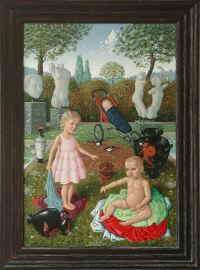Haarlem art: new life in a cultural graveyard?
Monday, November 13th, 2006
Haarlem is a major art center — in historical terms. When the genres of landscape and still life were revolutionary and new (in the 17th century), Haarlem artists were the key players. The Haarlem portrait painter Frans Hals is one of the most influential artists in history. Much of what is best about Manet‘s work he borrowed directly from Frans Hals. Van Gogh was hugely influenced by Frans Hals as well.
Haarlem also has one of the greatest Michelangelo drawing collections in the world. But this is a dead collection, in a sense: in a recent major exhibition in Haarlem, artists were not permitted to study Michelangelo’s work in the only way that makes sense, drawing within the exhibition itself, looking directly at the master’s work. Although there was a huge volume of visitors to the show, there was almost no serious critical analysis of the art or the exhibition (here are exceptions: 1, 2).
Thus, Haarlem is a cultural graveyard. Haarlem’s living inhabitants treat the past with silent, uncritical reverence. The tombstones of the old masters (native and foreign), cast a long shadow over contemporary artwork and creativity.
Artists in Haarlem today can be divided into two broad categories:
- those trying continue past traditions (especially in still life painting)
- those trying to be part of the great international art scene.
In the first category are some talented painters achieving commercial success with their neo-17th century still life paintings. But in this endeavor, they are little more than expert craftsmen. [Hanneke van Oosterhout is flirting with the idea becoming one of these, but I think she will pull out before it is too late].
In the second category are artists who are in denial about their place of residence. These artists would probably be better off if they moved to the real international art centers of today — New York, London, Berlin. How can one be a great international artist living in Haarlem, of all places?
Before we all pack up and move to New York, I’d like to point out that the action in the great living art centers of today is not all that impressive. I’ve spent a lot of time in New York and Berlin, with an eye to moving there for the sake of my art career. I was singularly unimpressed by what I saw in the living art culture. I might move to New York for its great museums, but not for its contemporary galleries.
More interesting to me than moving is to look at this cultural graveyard I live in, and see what are the weeds growing besides the tombstones. What is the new life here? Might it grow into something for the city to be proud of?
Where do you live and work? Could your city or town become an important art center? Or would you rather move to New York?
. . .
In a future post, I will profile what I consider to be the most exciting contemporary Haarlem artwork.